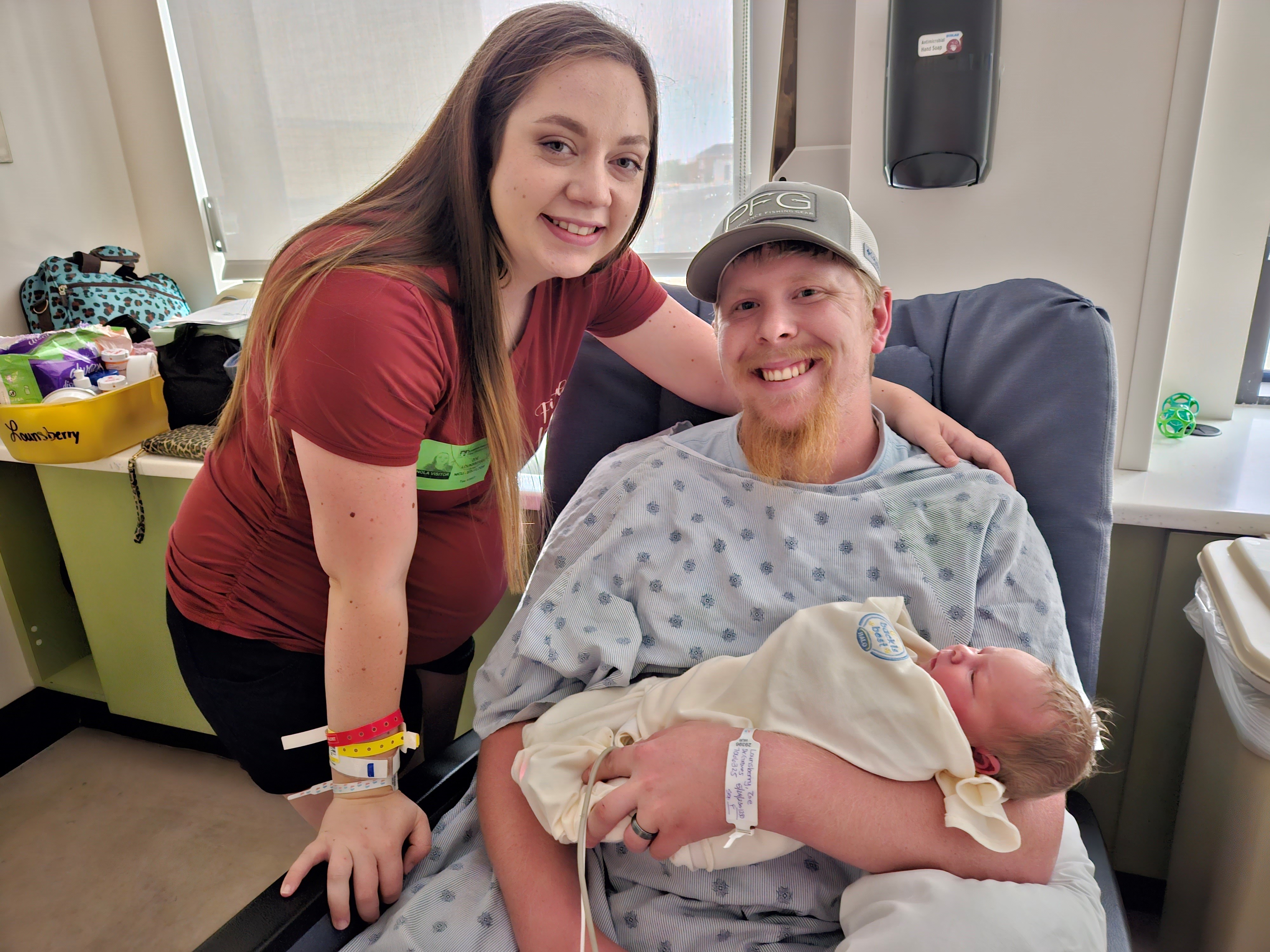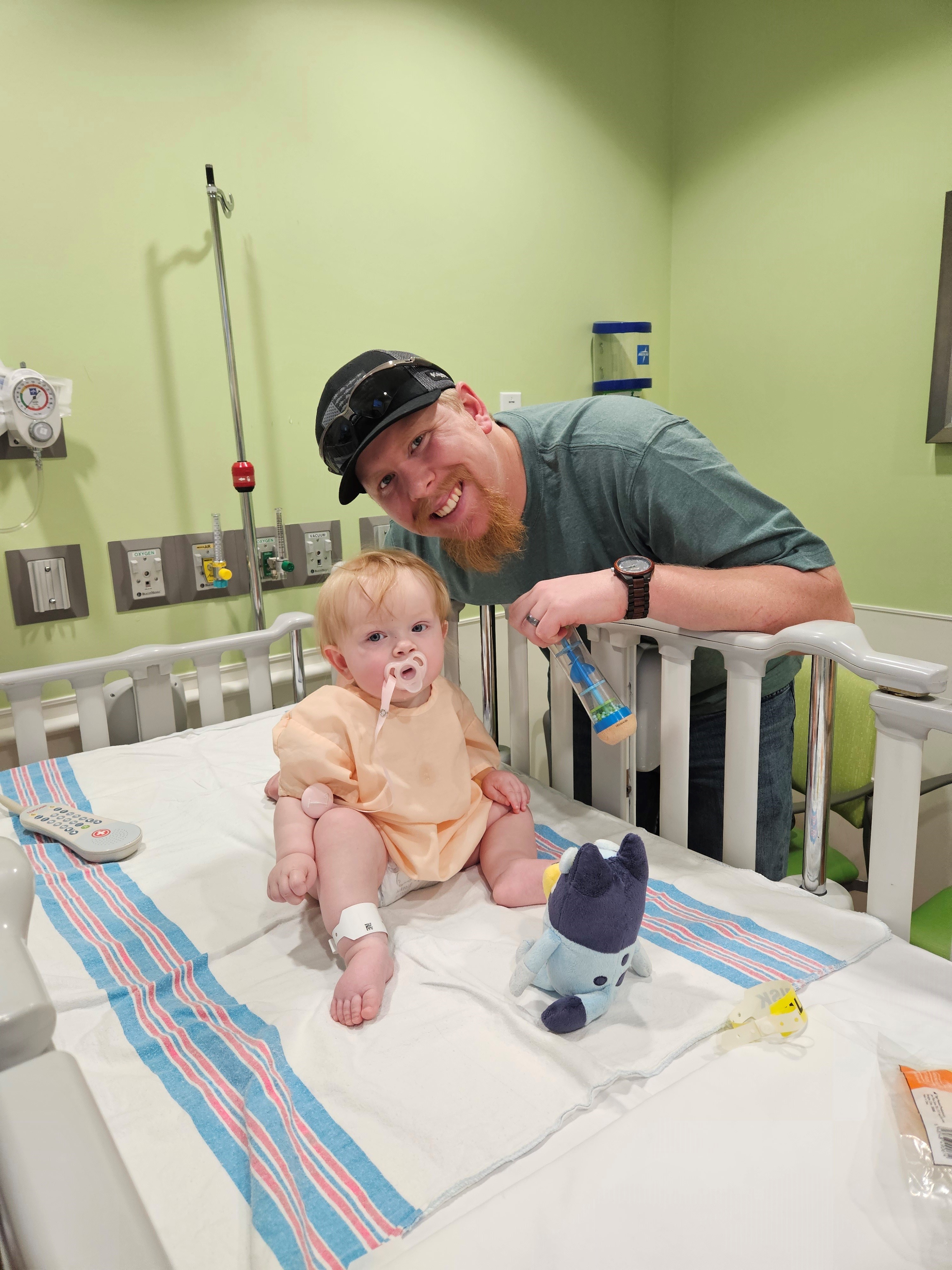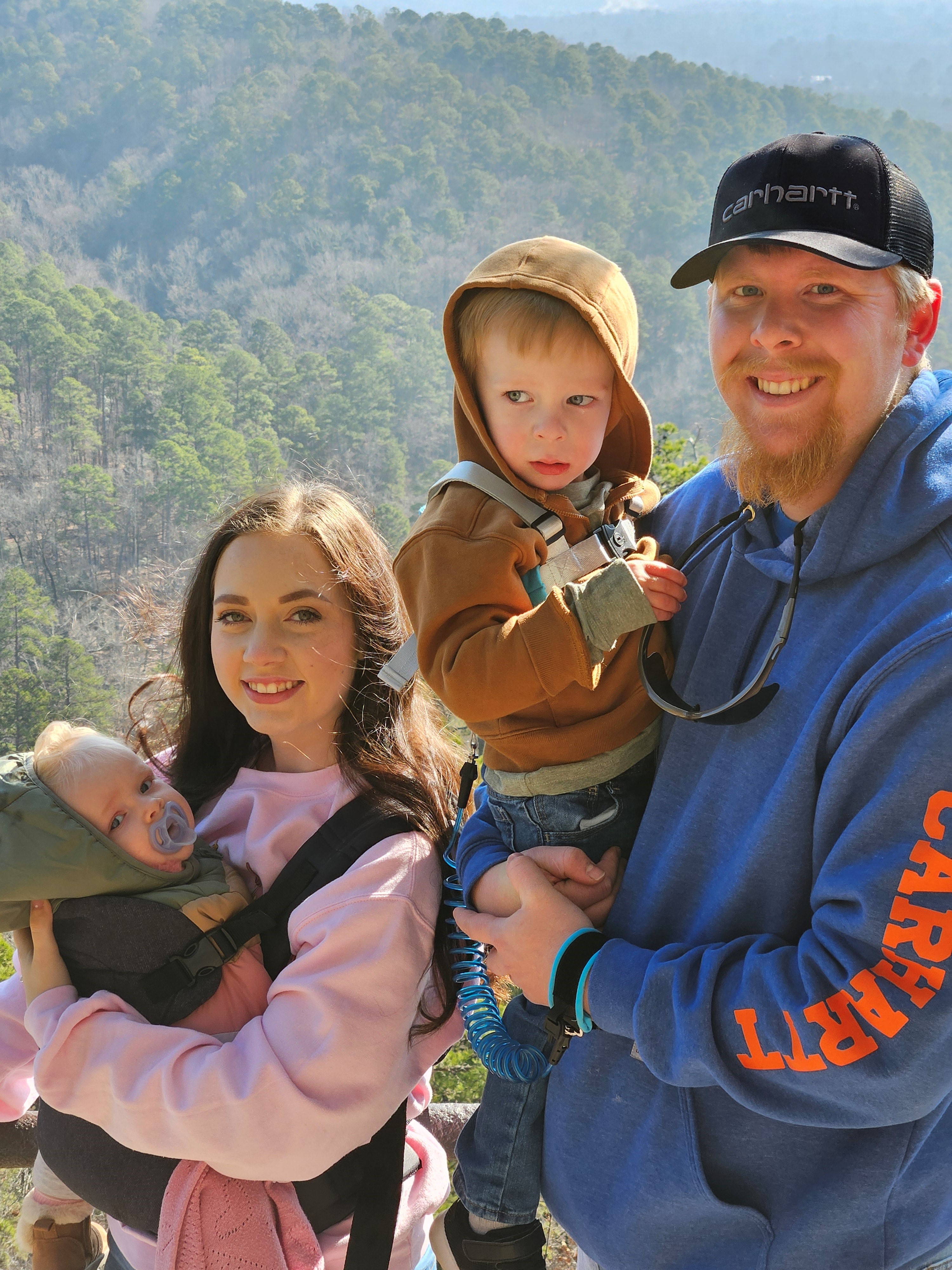Lydia’s Journey Overcoming Bladder Exstrophy: The Power of Family and Faith
- Category: Patient Stories
- Posted on:

Zoe Lounsberry and her husband Micah had been diligently preparing two-year-old Ezekiel for becoming a big brother. When baby Lydia arrived, however, the plan quickly changed. In the months that followed, the Lounsberry family would face numerous challenges, but they also found themselves abundantly blessed.
“I immediately saw the surprised look on the doctor’s face when Lydia was born,” recalled Micah. “He said, ‘We need to cut the cord and get NICU in here,’ so I started to move to cut the cord, but he did it and quickly moved Lydia to her own bed. That’s when I saw that something was on her abdomen. Before I knew it, the room was full of medical staff, and Lydia was being rushed to the NICU.”
After the local care team ensured that Lydia’s condition was stable, the NICU specialist explained to Zoe and Micah that she believed Lydia had bladder exstrophy, a rare congenital condition where the bladder has formed on the outside of the body. Most cases also include orthopedic issues, where the hips are “butterflied” or flared out and the pelvic bones are not joined. Because it is so rare – affecting about 1 out of every 50,000 births – there is little research on what causes bladder exstrophy.“She said more tests were needed to confirm there weren’t issues with other organs, like the heart and brain,” Micah said. “The helicopter to take Lydia to New Orleans was already on the way, and the specialist offered me two choices on where they could take her. I automatically said Children’s.”
For the next two days, Lydia underwent numerous tests and scans. Initially, ultrasounds of her heart and brain came back abnormal, prompting concerns about improper blood flow in the heart and impaired communication between the left and right sides of the brain. Lydia’s neonatologist wasn’t convinced the results were accurate and ordered for them to be repeated. The second set of ultrasounds showed the same concerning images, but years of experience told the team to test one more time.
“Those test results definitely added to the emotional rollercoaster of the first few days,” Zoe said. “Thankfully, the third echocardiogram and an MRI of the brain came back perfectly normal, but the diagnosis of bladder exstrophy was confirmed. We cried a lot during this time and worried about what the future held for Lydia and for us as a family. We had so many questions! It seemed like I was constantly pulling out my phone to add another one to our list.”
Micah and Zoe soon got the answers they were looking for from Dr. Christopher Roth, Pediatric Urologist at Children’s Hospital New Orleans. One of the most surprising pieces of news Zoe and Micah received that day was that they would be taking Lydia home within a few days, even though her bladder would still be outside of her abdomen. Dr. Roth explained Lydia’s closure surgery – which would put her bladder inside her abdomen, close her pelvis around it, and correct the flaring of her hips – would be more successful when she was older.
Going Home
Lydia was six days old when she was discharged from the Children’s NICU, but the learning journey had just begun for Zoe and Micah.
“Oh my goodness, the diaper changes,” Zoe recalled. “We couldn’t just put on a diaper because it would irritate the bladder and cause her a lot of pain. For the first few days, we were putting gauze covered with Vaseline over the bladder, but that wasn’t working well. We quickly learned to recognize when something was irritating her bladder because she had this blood-curdling cry when it was hurting.”
Dr. Roth suggested using squares of plastic wrap to cover the bladder, and that worked great for the family for a few months.
“I found a Facebook group for families of children with bladder exstrophy, and that was such a game changer for us,” Zoe said. “They had a lot of great advice, on everything from which hospital to choose for Lydia’s upcoming surgery to making the diaper changes easier. I got especially close to a mom in Alaska, who suggested using saline spray and Tegaderm dressings to cover Lydia’s bladder once we started having issues with the plastic wrap moving as she got more active.”
This advice came at a perfect time, as they were able to discuss it with Dr. Roth during Lydia’s next check-up.
“It just so happened that we got the Tegaderm suggestion right before one of Lydia’s normal check-ups with him,” Micah explained. “Dr. Roth said the idea sounded good to him and to give it a try. The Tegaderms worked great for us and made diaper changes so much easier and faster. That’s just another example of how Dr. Roth treated us like equal partners in this process and confirmed that we would have a voice in Lydia’s care decisions.”
Dr. Roth’s open-minded approach to this new idea was a sign for Zoe and Micah that he was the right person to care for Lydia. While many of the families in the Facebook group encouraged Zoe and Micah to take Lydia to a designated center of excellence for bladder exstrophy, they decided to stick with Children’s Hospital New Orleans.
“We looked into the stats and saw that many of the centers treated about five cases a year,” Micah said. “Dr. Roth told us that he will see two to three newborns a year with bladder exstrophy. Immediately, I did not think it was worth travelling farther away from home to risk having a doctor I might not even like when we already loved Dr. Roth and the Children’s team. But we prayed and asked our church family to pray with us about it. In the end, we knew we were where we were meant to be. We were closer to home and loved ones than we would have been anywhere else. We have zero regrets about staying at Children’s and would make the same decision if we ever faced something like this again.”
Dr. Roth's own experience underscored the significance of providing local, specialized care, especially as he recalled the strides made in pediatric urology within the region.
“Just 15 years ago, there was only one pediatric urologist in all of south Louisiana,” said Dr. Roth. “During my training here in New Orleans, I saw the regional need for access to specialized pediatric care, and I wanted to be a part of making a difference. Hearing from parents like Zoe and Micah about how important it was to receive care close to home and how their community rallied behind them during this journey is why I am so proud to be a part of a team that has worked hard to become the regional experts for complex conditions like bladder exstrophy.”
Time for Surgery
 For rare conditions like bladder exstrophy, the specialists at Children’s Hospital New Orleans will partner across disciplines to provide optimal care. Dr. William Accousti, a Pediatric Orthopedic Surgeon, works regularly with the Children’s urology team to treat the orthopedic defects associated with bladder exstrophy.
For rare conditions like bladder exstrophy, the specialists at Children’s Hospital New Orleans will partner across disciplines to provide optimal care. Dr. William Accousti, a Pediatric Orthopedic Surgeon, works regularly with the Children’s urology team to treat the orthopedic defects associated with bladder exstrophy.
“In Lydia’s case, her hips were extremely flared out,” explained Dr. Accousti. “If left untreated, she could have had a delay in learning how to walk or experienced hip pain or mobility issues as she got older. Since surgery is already needed to treat bladder exstrophy, it only makes sense for orthopedic and urology experts to partner for a single surgery. So, after Dr. Roth repositioned Lydia’s bladder and addressed her other urological needs, my role was to reform her pelvic bone structure and place an external fixator, which is a device to hold the pelvis in place while the bones heal.”
On Jan. 26, 2024, the orthopedics and urology teams at Children’s Hospital New Orleans had a single case on their surgery schedule – little Lydia’s big day had finally arrived. It would be 10 hours before Zoe and Micah would see Lydia again. Drs. Roth and Accousti worked together during her complex surgery and visited Zoe and Micah every time they switched out. As tough as that day was, the roughest road was in the days ahead. Lydia came out of surgery with her external fixator and four catheters. She would spend the next few days heavily sedated as the team optimized her pain management plan.
“The night after her surgery was our first attempt to wean her off the sedation,” Zoe explained. “Initially, she didn’t wake up, but we could tell she was in pain because she had this pitiful little cry, so we ended up alternating between sedation and pain medication to get her comfortable. The next day, her epidural was adjusted, and Lydia slept very peacefully that night.”
Five days after surgery, Lydia was doing well enough to be transferred from the ICU to a floor unit. To begin preparing Lydia to return home, one of her four catheters was removed a few weeks post-surgery.
“Later that day, she started crying, and nothing we did helped,” Micah recalled. “Even with the nurses helping us, we couldn’t figure out what was going on, so one of the urology residents was paged to come in. He found that a catheter had gotten clogged, and urine had backed up. He was able to unclog the catheter, and it was a 180. As soon as the urine drained, Lydia was completely happy again.”
After that, their confidence was further bolstered by Dr. Roth’s reassuring words as they approached the transition of taking Lydia home.
“I remember being so nervous about taking her home,” Zoe recalled. “It was really funny because Dr. Roth told me, ‘Zoe, you took her home with an organ outside of her body. I think you can handle a catheter,’ and, I was like, ‘Yeah, you’re right, this is no big deal.’”
At home, Zoe and Micah were faithful to flush Lydia’s two catheters every night, but after a few nights, one of the catheters would not flush. On the advice of Dr. Roth, the family returned to the hospital a few days later. Everything turned out to be fine! Since Lydia was there exactly four weeks after her surgery, Dr. Accousti visited to check her hips. He was pleased with how she was healing and decided to remove her external fixator.
“I had gone back home, and I remember getting the picture from Zoe of Lydia sitting up without the fixator and a big smile on her face,” Micah recalled. “While that was a big moment, we definitely learned to celebrate the little victories along the way. Otherwise, it could be easy to get overwhelmed and forget just how far you’ve come.”
The Best Wet Diaper
On Feb. 23, Lydia’s last catheter was removed, marking the first time in her young life that she didn’t have something outside of or attached to her body.
“We can’t even describe how that day felt,” Zoe said. “Of course, she has scars from the surgery, but those will be the only physical reminders of the challenges she faced. Dr. Roth has always assured us that this condition wouldn’t prevent Lydia from living a full life, and we knew that God was always in control, but this was the first day that we had felt truly free in almost nine months.”
Since the surgery, Lydia had been on a bladder relaxer, so urine continued to leak into her diaper as it had always done. The team decided it was time to begin decreasing the medication to see how the bladder would react and if it would hold urine.
“It took about a day, but that night, Lydia finally had a wet diaper on her own, and I went down to the nurses station cheering!” Zoe said. “We definitely had a party that night. Lydia got ice cream to celebrate, and I couldn’t wait to tell Micah.”
Zoe’s celebration with Micah was just the beginning. When Micah shared the news with his dad, it led to an unexpected display of emotion and tears.
“My dad is one of the toughest guys you’ll ever meet – he just doesn’t show a lot of emotion,” Micah explained. “I was with him when Zoe called me to say we had a wet diaper, and I just lost it. Then, my dad starts crying, and we’re standing in the front yard of the house we were working on just bawling over a wet diaper.”
Celebrating Milestones
As Lydia continues to grow, she will need ongoing medical care from the urology specialists at Children’s Hospital New Orleans. As Zoe and Micah look to the future, they feel compelled to share their story to inspire other families facing bladder exstrophy and to show their gratitude to their community.
“The support from our church and community was overwhelming,” Zoe said. “In the days after Lydia was born and following her surgery, we had a steady stream of food. People made blankets and bought toys for Ezekiel so that he continued to feel cared for when my and Micah’s attention had to be on Lydia. One member of our church even heard about my frustrations trying to clothe Lydia while she had her external fixator, so she handmade these precious little dresses. I still put Lydia in those dresses just because they’re so cute! People we didn’t even know would stop us while we were out to say they were thinking about and praying for us, so we just felt surrounded by love.”
Today, Zoe and Micah stay actively involved in their bladder exstrophy Facebook group, offering their experiences and advice to families facing new diagnoses, and most importantly, showing that this condition can be overcome.
“Our prayers have been answered,” Micah said. “Our little girl is okay, and the worst is over. We are closer to God than we’ve ever been, and our family is stronger than before.”
For more information about the expert pediatric urology care at Children’s Hospital New Orleans, visit www.chnola.org/services/urology/. Learn more about our orthopedics team at www.chnola.org/services/orthopedics/.




